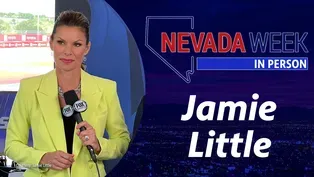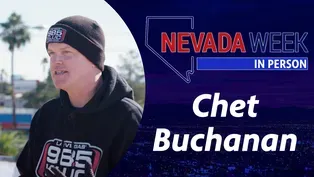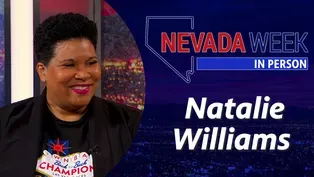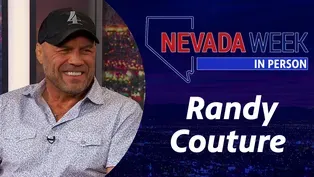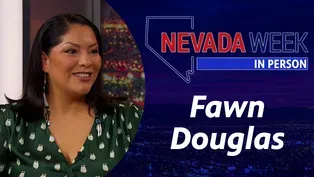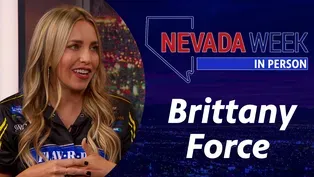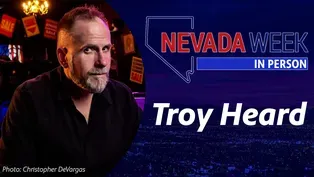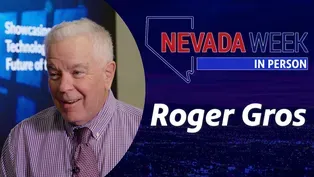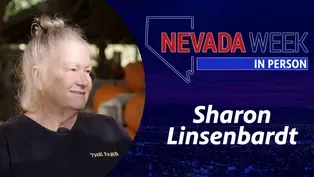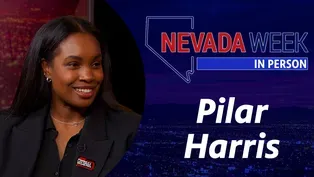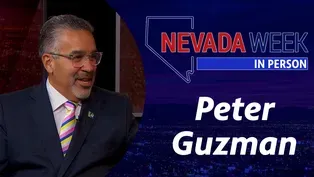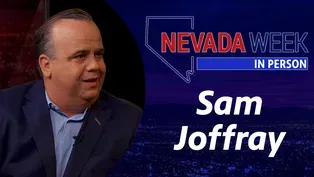
Nevada Week In Person | Beth Martino
Season 1 Episode 75 | 14mVideo has Closed Captions
One-on-one interview with Beth Martino, President and CEO of Three Square Food Bank
One-on-one interview with Beth Martino, President and CEO of Three Square Food Bank
Problems with Closed Captions? Closed Captioning Feedback
Problems with Closed Captions? Closed Captioning Feedback
Nevada Week In Person is a local public television program presented by Vegas PBS

Nevada Week In Person | Beth Martino
Season 1 Episode 75 | 14mVideo has Closed Captions
One-on-one interview with Beth Martino, President and CEO of Three Square Food Bank
Problems with Closed Captions? Closed Captioning Feedback
How to Watch Nevada Week In Person
Nevada Week In Person is available to stream on pbs.org and the free PBS App, available on iPhone, Apple TV, Android TV, Android smartphones, Amazon Fire TV, Amazon Fire Tablet, Roku, Samsung Smart TV, and Vizio.
Providing Support for PBS.org
Learn Moreabout PBS online sponsorshipMore from This Collection
Nevada Week In Person | Jamie Little
Video has Closed Captions
One-on-one interview with Jamie Little, NASCAR Broadcaster (14m)
Nevada Week In Person | Chet Buchanan
Video has Closed Captions
One-on-one interview with Chet Buchanan,Host & Creator, 98.5 KLUC’s The Chet Buchanan Show (14m)
Nevada Week In Person | Natalie Williams
Video has Closed Captions
One-on-one interview with Natalie Williams, General Manager, Las Vegas Aces (14m)
Nevada Week In Person | Randy Couture
Video has Closed Captions
One-on-one interview with Randy Couture, UFC Hall of Famer & U.S. Army Veteran (14m)
Nevada Week In Person | Fawn Douglas
Video has Closed Captions
One-on-one interview with Fawn Douglas, Artist and Activist, Nuwu Art (14m)
Nevada Week In Person | Brittany Force
Video has Closed Captions
One-on-one interview with Brittany Force, World Champion Drag Racer (14m)
Nevada Week In Person | Troy Heard
Video has Closed Captions
One-on-one interview with Troy Heard, Artistic Director, Majestic Repertory Theatre (14m)
Nevada Week In Person | Roger Gros
Video has Closed Captions
One-on-one interview with Roger Gros, Publisher, Global Gaming Business Magazine (14m)
Video has Closed Captions
One-on-one interview with Sharon Linsenbardt, Owner, Las Vegas Farm and Barn Buddies Rescu (14m)
Nevada Week In Person | Pilar Harris
Video has Closed Captions
One-on-one interview with Pilar Harris (14m)
Nevada Week In Person | Peter Guzman
Video has Closed Captions
One-on-one interview with Latin Chamber of Commerce Nevada President & CEO Peter Guzman (14m)
Nevada Week In Person | Sam Joffray
Video has Closed Captions
One-on-one interview with Sam Joffray, President & CEO, Las Vegas Super Bowl LVII Host Com (14m)
Providing Support for PBS.org
Learn Moreabout PBS online sponsorshipTasked with tackling hunger in Southern Nevada, Beth Martino, the new CEO of Three Square Food Bank, is our guest this week on Nevada Week In Person.
♪♪♪ Support for Nevada Week In Person is provided by Senator William H. Hernstadt.
-Welcome to Nevada Week In Person.
I'm Amber Renee Dixon.
According to Three Square Food Bank, 1 in 7 Southern Nevadans is hungry.
As the new CEO of Three Square, it's now her mission to feed them.
Beth Martino, thank you for joining Nevada Week In Person.
(Beth Martino) Well, thanks for having me.
It's nice to be here.
-So a month into the job, a job that your predecessor Brian Burton held for 11 years, how have you spent this first month trying to acclimate?
-Well, it's been a really good first month.
My focus over the first several months is really to just listen and learn in the community.
I'm fortunate that I've been in Nevada for about seven years, so I know Southern Nevada well at this point.
But my focus has been on listening to our community partners, getting out and visiting with them, listening and learning from the staff at Three Square, and just talking to all of our stakeholders as much as I can to get a better understanding of the role that Three Square plays in the community and what the needs are.
-You told me off camera that you spent a day with one of your drivers going out to the different food distribution sites or the pantries, I guess.
-Yes.
-What stood out to you from that experience?
-Well, it was a great day.
Getting to spend some time with our drivers is always important to me.
They are really at the heart of what Three Square does.
But probably the most notable observation I had from that day was every place we stopped-- we're usually there two or so hours before a food distribution happens.
So whether it's a drive-through distribution or a food pantry, they're scheduled to open a couple of hours after we arrive.
And to a location, there were people lined up everywhere we went.
So there are cars lined up for a mile, or there are people waiting outside the doors.
So what we know from that, just anecdotally, is that there's a need and that that need really hasn't changed and that it might be growing.
That's also reflected in the data that I've seen since I started at Three Square.
We know that across all of our food pantries and programs, we're seeing about a 15% increase, and that was really borne out by what I saw on that day.
-Waiting for hours ahead of time.
-Mm-hmm.
-What do you believe the increase is attributed to?
-Well, it's probably a multitude of factors.
You know, I think we kind of have a, potentially a perfect storm of things going on over the last few months.
Some changes to SNAP benefits have occurred.
So that means for a lot of people, their SNAP benefits have been reduced.
So you know, for folks who are hungry, it's often a puzzle piece that they've put together and kind of the whole picture of how they're putting food on the table for the month.
So if you take some element of that away, then the puzzle is incomplete.
And if you reduce SNAP benefits, which there's been some fairly dramatic reductions there over the last few months, that means they may be visiting their food pantries a little more than usual.
And there's been some other things, though, that have happened.
You know, we've seen the employment situation change.
Nevada, unfortunately, still has a relatively high unemployment rate compared to some of our neighboring states.
And we also know that with a public health emergency ending, that some people may have lost their Medicaid benefits.
So that could affect the expenses they have for healthcare.
And with all those things coming together, I think what that means is that we're going to see more need, and maybe for some time to come, in Southern Nevada.
-So what do you do?
That's what you got to figure out, huh?
-Well, I guess that's, that's my job, in part, but I think that's why it's really important, from my perspective, for us to listen to our community partners.
We work with, you know, 120 or so agencies across Southern Nevada.
And talking to them about what they're seeing, how they're helping people, what they've learned over the recent months about how the need is changing or what the most prevalent needs are, that really allows us to try to adjust our services and see what we can do to try to help them meet that need.
-What drew you to this cause?
-Well, I think food is, you know, really a fundamental right.
We want everyone-- and I personally think that everyone should have access to nutritious food.
So the idea that there are people in this country that are going hungry is really just kind of heartbreaking to me, but particularly when I think about children and seniors.
I mean, I certainly don't want anyone to go without food, but how can we expect children to learn when they're hungry?
For our seniors who may have a number of challenges from mobility to transportation and may be isolated at home without a lot of resources to draw on to get out and go to the grocery store, I think for those audiences in particular, I feel really compelled to try to find solutions to make sure that they can put nutritious food on the table.
-Has there been an experience you've had recently with either population that stood out to you?
-Well, last week I went out to the Clark Library here in Las Vegas.
Three Square actually serves a meal at a public library every day of the week, five days a week here in Las Vegas.
And so I went out to the meal at Clark Library and was able to serve lunch to seniors there.
And one of the things that really struck me about that, we served about 200 seniors that day, is kind of the socialization that happens there.
So it's definitely about bringing that meal to people, but also giving people a chance to come together and interact.
And the public library system is a great partner for us because, you know, some days like last week, people are just socializing and chatting amongst themselves.
It's great for them to get out and kind of interact.
But some weeks, the library has an enrichment activity of some kind.
And people come because they want and need to get a meal, but they're also coming because it's a chance for them to talk with their neighbors.
And I think that's really great to see.
-Yeah, avoiding that isolation.
Loneliness is an epidemic according to some of the officials at the national level within the medical field.
Tell me how you think you could solve hunger in Southern Nevada.
What ideas do you have?
-Well, I think part of what we have to do is look at what brings people to a food pantry in the first place.
And so obviously at Three Square, the core of our mission is feeding people when they're hungry.
So I want to make sure that we're providing people with a meal.
But the bigger question is how do we help people who, you know, have other needs, besides needing food?
What brought them to that food pantry in the first place?
So there are a lot of different ways that people around the country are talking about that.
For me personally, I think one area that's of interest is workforce development.
There are many people in our community who want to find a job or they want to get to work, but they may not have the skills needed for whatever particular industry or role they're looking for.
And so there may be some opportunities for Three Square to partner with other organizations that are interested in workforce development.
But a great program when I was in Maryland called FoodWorks, where we used the kitchen that was at the food bank there to train people for hospitality jobs and place them into into jobs in the community.
So something along those lines, I think, is definitely intriguing to me.
But another piece of that is also just what our community partners are already doing.
We have a number of organizations in the community that provide what we call wraparound services.
So you come in, you visit the food pantry, but then they ask you why you're there and what are some of the other needs you might have.
So whether it's housing or transportation or childcare or a medical bill, they may be able to connect you with other resources to resolve some of those outstanding issues that are bringing you to the food pantry.
So looking for ways that Three Square might be able to support organizations that provide some of those wraparound services.
-So you did work at a food bank in Maryland.
-Yes.
-That's a really unique opportunity that you're talking about, because the hospitality sector would work perfect here.
As we also talked about off camera, though, the tourism, the hospitality aspect of Southern Nevada's economy can sometimes make it a more difficult challenge when you are addressing hunger.
How so?
Can you explain that?
-Well, I think what you see sometimes in the economics of Nevada is that a recession may last a little longer, unemployment may be a little higher.
I've heard a few people say that when the rest of the country gets a cold, Nevada gets the flu.
And so the makeup of our economy may mean some different things for the state of Nevada.
But I think that that can be true in other areas of the country.
You know, every state has a slightly different set of economic drivers.
So what we want to look for here, I think, from Three Square's perspective is, you know, what can we learn from our community, whether that's research based and using the data that we've collected or whether that's talking to our community stakeholders to really understand what's driving people to need food more today than they did three or four months ago, and what can we do to try to help address that?
Because workforce development is definitely something that I think is interesting, and there are already some great organizations in the community that provide some of those services.
So again, my focus is really on how can Three Square be a great partner for the organizations that are here and doing that good work?
-I want to get into a little bit of your work history.
So prior to joining Three Square, you worked as Senior Vice President of Public Affairs for the American Health Care Association, which represents nursing homes and assisted living communities.
In that role, according to your bio, you helped produce an Emmy award winning documentary about the impact of COVID on those facilities.
What would our viewers be surprised to learn from that documentary if they were to watch it?
-Well, we had a really unique opportunity to tell the story of what happened in two nursing homes.
We represented, you know, thousands of nursing homes across the country, but we featured one on each coast, one on the East Coast, one on the West Coast.
And we spent time in both of those facilities, talking with the staff about what things really looked like during COVID.
And, you know, the pandemic affected everyone differently, but there are also some uniting themes.
And what really, I think, you can take away from that documentary is the hope that people had that things will improve, that we will learn and get better from the things that happened during the pandemic.
The heroism of people in healthcare, I think that story feels like it was broadly told, widely told.
But sometimes nursing homes are left out of that picture.
And so that documentary gave us an opportunity to give a voice to some people that may not have been in the spotlight as much for some of the great things that they did during the pandemic.
And for me, kind of being that voice for people that might be underserved or not heard from has always been important.
So I was really glad that we were able to do that.
-This is a hard question, but are we in America taking care of our older adults sufficiently?
-Well, you know, I think there's still a lot of stigma around aging.
That's one of the things that I think makes, you know, things difficult for the long-term care industry.
There's just some stigma around aging, and none of us really want to sit around and think about what it means to get older.
But fortunately, there are a lot of people in our community here in Southern Nevada that want to make sure that we're taking good care of our seniors.
At Three Square, we've been incredibly fortunate to have many stakeholders, donors, other people in the community come forward and say, What can we do to help addressing your hunger?
And so I think, I feel like we're in a really unique position here to be able to take good care of our seniors in Southern Nevada.
-We had talked about the reduction in SNAP benefits.
Seniors during COVID were receiving something like $250 in SNAP benefits.
That's been reduced back to about $23.
You have a role that you can play within legislation.
What do you anticipate doing in the coming months?
-So this is a big year for SNAP benefits and some other programs because they're all wrapped up in one piece of legislation called the Farm Bill, which is reauthorized, I believe, every five years.
So this year, Congress will be debating the Farm Bill.
And there are a lot of things in the Farm Bill, but from Three Square's perspective, two of the most important things are SNAP benefits and the government commodities program.
So in Nevada, unfortunately, and in states across the country, SNAP benefits have been drastically reduced as different elements of the public health emergency came to an end.
So you are correct in that the minimum benefit for some of our seniors is as low as $23 a month at this point.
So that's a real struggle for people who, again, are kind of trying to piece together over the course of a month how they're going to put food on the table.
So what we'd really like to see in the Farm Bill is that minimum benefit increased.
So if we can get just even a small increase in the minimum benefit, that makes a difference for folks.
And we certainly are looking forward to talking with our congressional delegation about how we can support efforts to look at that.
-And we didn't get to get to this, but you were Director of Communications and Press Secretary for Kansas Governor Mark Parkinson and Governor Kathleen Sebelius.
So perhaps that experience will help you as you work with legislators.
-I hope so.
-Beth Martino, CEO of Three Square, thank you so much for joining Nevada Week In Person.
To see more interviews like this, go to vegaspbs.org/nevadaweek.
♪♪♪
Support for PBS provided by:
Nevada Week In Person is a local public television program presented by Vegas PBS
